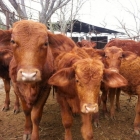-
 +32 +4
+32 +4‘Never seen that much rain’: Quebec farmers say climate change killing crops | Globalnews.ca
Quebec farmers are demanding more help from the provincial government in order to face the rise in extreme weather events, which they say are killing crops on a massive scale.
-
 +27 +7
+27 +7At a shuttered Texas coal mine, a 1-acre garden is helping feed 2,000 people per month
The garden in the middle of a 35,000-acre former mine is supplying thousands of pounds of fresh produce to families in three counties that have few grocery stores.
-
 +12 +3
+12 +3'No kill' meat, grown from animal cells, is now approved for sale in the U.S.
Two U.S. food companies have received the go-ahead to sell chicken grown from cultivated animal cells in a production facility. It's the first time meat grown this way will be sold in the U.S.
-
 +30 +9
+30 +9More wildlife-friendly farming needed to stop decline of insects in Britain, says report
Conservation measures over the past 30 years have failed to stop the decline of insects on British farmland, a new report shows. Populations of bees, spiders, ground beetles and hoverflies have disappeared twice as fast in areas intensely farmed for crops, according to the paper, which looked at citizen science data on more than 1,500 invertebrate species.
-
 +24 +4
+24 +4'Regenerative agriculture' is all the rage - but it's not going to fix our food system
We know industrial farming needs to change. But regenerative agriculture may not be the transformation our global food system needs.
-
 +20 +2
+20 +218,000 cows killed in explosion, fire at Texas dairy farm may be largest cattle killing ever
The biggest single-incident death of cattle in the country in at least a decade leaves officials asking, \
-
 +15 +4
+15 +4B.C. vertical farming company says it could produce up to 6 million bags of salad greens a year | CBC News
UP Vertical Farms is growing leafy greens on shelves stacked atop one another on a piece of land a fraction of the size needed for traditional farming.
-
 +13 +2
+13 +2The shift to a green energy future is renewing plantation-era water wars in Hawaii
Wesley Yadao, 71, farms five acres of taro in a region of Kauai where generations of families have tended the starchy root vegetable in wet paddies fed by the Waimea River. His tough-knuckled hands betray the necessity of a strong work ethic, an indelible link to his great-grandparents who planted the first seeds of the family’s taro-farming legacy.
-
 +22 +4
+22 +4AI-powered robots cut out weeds while leaving crops untouched
In farming, weeds can strangle crops and destroy yields. Unfortunately, spraying herbicides to deal with the intrusive plants pollutes the environment and harms human health and there simply aren't enough workers to tackle all the weeds by hand.
-
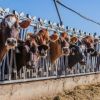 +4 +1
+4 +1Meat, dairy and rice production will bust 1.5C climate target, shows study
Emissions from the food system alone will drive the world past 1.5C of global heating, unless high-methane foods are tackled. Climate-heating emissions from food production, dominated by meat, dairy and rice, will by themselves break the key international target of 1.5C if left unchecked, a detailed study has shown.
-
 +19 +2
+19 +2Researchers find a more sustainable way to grow crops under solar panels
Researchers say they have determined a way to make agrivoltaics — the process of growing crops underneath solar panels — more efficient. They found that red wavelengths are more efficient for growing plants, while the blue part of the spectrum is better for producing solar energy. Solar panels that only allow red wavelengths of light to pass through could enable farmers to grow food more productively while generating power at the same time.
-
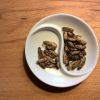 +4 +1
+4 +1Making the case for using insects as food for both humans and livestock
Two pairs of academics are making the case for using insects as a food source in Perspectives pieces published in the journal Science. The first pair, Arup Kumar Hazarika and Unmilan Kalita, with Cotton University and Barnagar College, respectively, both in India, argue that a strong case can be made for using insects to meet the growing need for food around the world in the coming years.
-
 +16 +5
+16 +5‘Holy grail’ wheat gene discovery could feed our overheated world
Harvests that form a vital element of the diets of 4.5 billion people are being devastated by global heating. Now research has found a key to create a heat-resistant variety
-
 +13 +2
+13 +2Three’s a crowd: how farmers are cutting out the supermarkets
Giving up police work to grow passion fruit might be considered an unconventional career move, but that is what Sergio Quijada Domínguez did when a hereditary heart condition forced him to retire at the age of 32 after 14 years in Spain’s Guardia Civil. Quijada, who has about 1,500 plants on his farm near Vélez-Málaga in southern Spain, found he was good at growing passion fruit – what he lacked was the knowhow to sell them.
-
 +16 +3
+16 +3How agriculture hastens species extinction
Scientists believe humans are now causing a mass extinction of plants and animals. Modern agriculture is a major contributor.
-
 +20 +4
+20 +4New Skyscraper-Size Pig Farm Is a Mind-Blowing 26 Stories High
The biggest single-building pig farm in the world speaks to the dystopian nightmare that is animal agriculture.
-
 +22 +2
+22 +2Superbug fight 'needs farmers to reduce antibiotic use'
Health and animal welfare campaigners concerned about the spread of superbugs in humans are calling for a ban on the overuse of antibiotics in farm animals. They say routinely using antibiotics in livestock can lead to bacteria becoming resistant and such 'superbugs' could spread to humans.
-
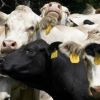 +16 +3
+16 +3McDonald’s and Walmart beef suppliers criticised for ‘reckless’ antibiotics use
Suppliers of beef to McDonald’s, Taco Bell and Walmart are sourcing meat from US farms that use antibiotics linked to the spread of dangerous superbugs, an investigation has found. Unpublished US government records obtained by the Bureau of Investigative Journalism and the Guardian show farms producing beef for meat packing firms Cargill, JBS, and Green Bay are risking public health by still using antibiotics classed as the “highest priority critically important” to human health (HP-CIAs).
-
 +25 +5
+25 +5Why does the US allow a controversial weedkiller banned across the world?
Paraquat is outlawed in the EU, UK, Switzerland and China as a growing chorus of US advocacy groups demand the EPA change its position
-
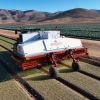 +22 +2
+22 +2This new farming robot uses lasers to kill 200,000 weeds per hour
In February, agricultural robotics company Carbon Robotics unveiled its 2022 LaserWeeder implement, a cost-effective weed control solution for large-scale specialty row crops.
Submit a link
Start a discussion





















